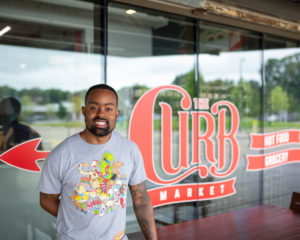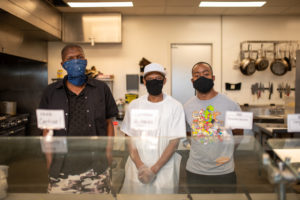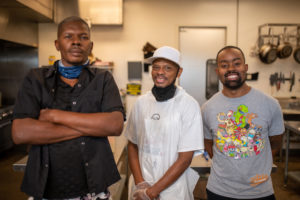
The writer of this PGF story is Laura Bonds.
Since this article was written, Curb Market has transitioned to new management. Butch Harmon is now the operating manager.
Curb Market has long been inspired by its surroundings and the community it serves. The mission is an 80+ year old endeavor, dating back to the 20s and 30s when a farmers’ market was situated on the curb at Poplar and Cleveland, a few blocks up the street from its current location at Crosstown Concourse. During that time, Curb Market provided home-grown produce to its neighbors, and though the business developed over the decades and moved to brick and mortar locations, the desire to serve the people of Memphis was never lost.
In 2017, nearing a century since the business served Memphians from the curbside stand, Curb Market moved into the platinum LEED certified Crosstown Concourse building. Its location in Crosstown not only contributes to their minimized use of energy, it inspires Curb Market’s general manager, Randall Thomas, to do more for the environment. Relying on natural light from the large windows at their storefront, energy saving lights detect when light is strong, and the lightbulbs dim
 Randall is relatively new to the Curb Market family when you think of its long history, having stepped in less than a year ago as General Manager. That hasn’t stopped him from implementing meaningful changes. Randall had previously partnered on projects with Janet Boscarino, Executive Director of Clean Memphis. When he accepted the job as General Manager, he began shifting resources to be more environmentally friendly, including becoming Project Green Fork certified and streamlining use of products. “We streamlined what products we were buying and using versus throwing away,” and Randall says it has contributed to thousands of dollars saved for the local grocer.
Randall is relatively new to the Curb Market family when you think of its long history, having stepped in less than a year ago as General Manager. That hasn’t stopped him from implementing meaningful changes. Randall had previously partnered on projects with Janet Boscarino, Executive Director of Clean Memphis. When he accepted the job as General Manager, he began shifting resources to be more environmentally friendly, including becoming Project Green Fork certified and streamlining use of products. “We streamlined what products we were buying and using versus throwing away,” and Randall says it has contributed to thousands of dollars saved for the local grocer.
Kitchen and deli trimmings as well as produce too badly blemished to sell at discounted rates are composted. With a hot bar serving meals each day, Curb Market composts 250 pounds of food each week. What food can be reused is purposed into casseroles or other dishes sold at their hot bar or donated to food banks around the city, totaling 100 pounds of food donated each week. Additionally, to-go boxes, lids and straws are compostable, and Curb Market is encouraging consumers to shop with reusable and compostable bags, including Curb Market branded bags that Randall expects to arrive any day.

Perhaps the most impressive aspect of Curb Market’s commitment to green practices is its dedication to the neighboring community and sourcing local food. “Part of our mission is staying true to community,” Randall explained, “What better way to do that than by being sustainable?” The market has hundreds of relationships with farmers and vendors around the south who provide the grocery with the freshest produce and interesting products. “If it’s made in the south or made in the city, it’s something to look at,” Randall said.
Looking around the store you’ll see laminated cards highlighting specialty local items and the people who make them. Customers browsing the aisles learn about Braggadocio Rice and the tornado that ripped through their fields and led them to producing rice. They become familiar with Bootsie’s Delta Funk BBQ, a family bringing pre-1940s barbecue to 21st century eaters with recipes passed down through generations. Or maybe they stop and smell a candle from 701 Candle Co based in Memphis and read how the budding business launched during the pandemic. Passersby willing to take a few seconds to read about the products in the store can learn about the families and neighbors filling their shelves, all part of Curb Market’s plan to run a business by and for its community.
By giving their customers a chance to get to know the products, Curb Market intertwines the producers with the consumers and builds symbiotic relationships that support the larger ecosystem of nearby growers and businesses. “It’s our duty to give farmers a platform,” Randall stated. This support also lends itself to curbing the carbon footprint since most of its products are sourced from the South. This is a departure from the typical transportation a big box store requires, and it’s something Randall touts proudly.
Both what the market brings in and what it puts out are driven with the community in mind. Inspired by its community and surroundings at Crosstown, Curb Market makes daily decisions that affect neighbors far longer than the lifespan of the food on its shelves. From composting to donating unused or imperfect foods to supporting local growers and makers, Curb Market truly cares about its environment and those who inhabit it.
